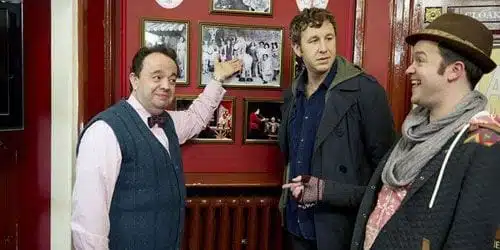
At the start of Family Tree, Tom Chadwick (Chris O’Dowd) receives a trunk full of family heirlooms as an inheritance from a great-aunt he hardly knew. The random items propel him on a quest across England to discover more about the family that until this point, he did not think extended much beyond his father, Keith (Michael McKean), and sister, Bea (Nina Conti). The reason for his lack of background, the show suggests, is because of his parents’ divorce when he was a boy: Tom’s mother moved him to Ireland and his sister stayed with Keith in London. Now Tom is 30 and, recently having lost both his girlfriend and his job, he takes the opportunity to begin again by looking back.
This elaborate premise doesn’t sound like promising material for a comedy series, but Christopher Guest has based his films on other unlikely concepts, from dog shows and community theater to folk singers. Family Tree is Guest’s first attempt to adapt the improvisational fake documentary idea that worked so well in Best in Show, Waiting for Guffman, and A Mighty Wind (not to mention the granddaddy of the genre, This is Spinal Tap, in which Guest starred) for the small screen. It’s not a smooth transition, but it is moderately successful.
The mockumentary idea might even be termed a formula now, with the formal elements (single camera, interviews) shaping the narrative concept, focused on an peculiar subculture populated with quirky characters played by talented improv comedians. The formula is already available on TV without Guest’s imprint, informing current shows such as The Office, Parks and Recreation, and Modern Family. Family Tree doesn’t follow the formula completely, but it does enough to remind you of the possibilities.
The show takes a while to get to that formula. The inherited trunk is a clumsy device, its contents revealed only one item at a time, whenever Tom pulls one out in order to keep his narrative momentum going. That momentum is relative by definition, as any individual’s research — perhaps particularly into personal history — tends to be compelling only to the researcher, the one who may be surprised by deceptions or revelations. In this case, even Tom’s own family does not seem especially interested in what he is finding. Even as he approaches each new discovery with enthusiasm, viewers who don’t have an original notion to be revised may not care that this aunt was a lesbian or that an entire branch of the family was the result of an affair.
But if the plot is thin, the show does offer other pleasures, including the actors’ improv skills, revealed in subtle and hilarious flashes of genius. O’Dowd has quickly become a favorite in comedy circles because of his strong supporting performances in Bridesmaids and Girls. To date, he’s played mostly straight men. And here again, Tom’s reactions help to make his surroundings — the places, the people — seem funnier. When he goes on a blind date, for instance, his increasing concern is low-key but palpable, as he listens to the woman explaining that dinosaurs still exist.
Tom’s calm forms something like a center, around which his more offbeat friends and relatives might swirl. A visit with Bea reveals that she was given a monkey puppet as a form of therapy following their parents’ split. Today, she still takes Monkey with her everywhere, and Monkey says whatever is on her mind, flinging each bit of insight like a verbal hand grenade. Bea and Monkey’s effort to pitch themselves as entertainment for a young child’s birthday party is both caustic and extremely funny, and sight gags, such as Monkey trying to count out money at Bea’s bank teller job, are even better.
More antics are provided by Tom’s friend, Pete Stupples (Tom Bennett), who comes along for much of the ride, mainly because, like Tom, he doesn’t seem to have much better to do. Pete sometimes seems to be doing a Ricky Gervais impression, and adds to the humor mainly by suffering indignities, such as getting beaten by a tween in a boxing match and assisting in the artificial insemination of a llama.
The mix of gags isn’t always coherent in Family Tree, perhaps because its own background is a bit messy, being a BBC and HBO coproduction. As in Episodes, a BBC and Showtime collaboration, there are times when differing sensibilities seem to clash. The first few episodes of Family Tree may hit the mark more with a British audience than an American one, particularly in the series of clips from fake TV shows full of references to BBC programming history. Similarly, an exchange between two characters about English and Irish accents will be lost on those who think these accents sound much the same to begin with. American viewers in search of their own sort of familiarity may feel reassured by Tom’s coming adventures Stateside.

